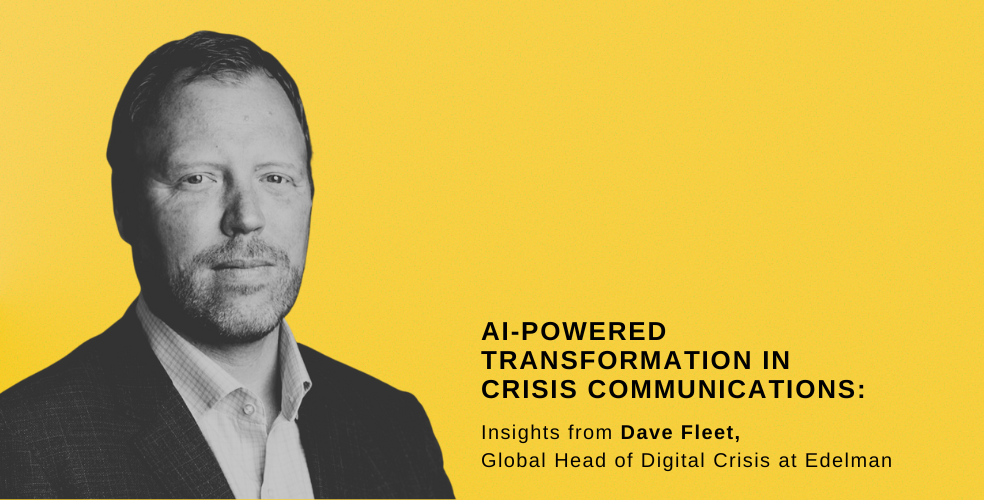 August 21, 2023
August 21, 2023

Crisis Communications in a Changing World: Expert Insights and Strategies
August 22, 2023
In an era defined by polarization, where every issue seems to carry political and societal implications, the role of corporations extends far beyond the products they offer. As the lines between business and socio-political landscapes blur, organizations find themselves compelled to take stances on various matters – a strategic move that can significantly impact their reputation and public perception. In this intricate tapestry of AI advancement, rapid information dissemination, and the proliferation of fake news, the realm of crisis communications has reached unparalleled levels of complexity and stress.
Welcome to a world where crises can emerge in a single viral tweet, and misinformation can snowball into a full-blown reputation catastrophe. Navigating this landscape demands more than just textbook crisis management; it necessitates a profound understanding of the interplay between technology, public sentiment, and corporate responsibility. The challenges have never been more daunting, and the stakes have never been higher.
As we peer into this multifaceted landscape, we recognize that effective crisis and reputation management have become paramount. To shed light on these challenges and unveil strategies for success, we turned to the experts – the seasoned voices at the forefront of crisis communications. These industry leaders are poised to share their insights at our upcoming “Crisis Communications Boot Camp”, scheduled for September 21-22 in Vancouver. This event brings together minds that have weathered communication storms, and they graciously shared a glimpse into the hurdles they face and the approaches they're adopting to navigate the treacherous waters of reputation management.
Polarization and Uncertainty: Lisa Huie, Public Relations Leader at IKEA Canada
Lisa Huie, Public Relations Leader at IKEA Canada, succinctly encapsulates a key challenge faced by communicators today. Reflecting on the current landscape, Lisa emphasizes that polarization and uncertainty are among the most pressing hurdles. She astutely notes that uncertainty breeds fear and anxiety, which, in turn, fuels the flames of polarization. Within the complex realm of modern communications, navigating multifaceted issues ranging from identity and belonging to safety and sustainability can be overwhelming, leaving communicators little respite as they move from one issue to the next. In the face of this constant whirlwind, Lisa stresses that trust emerges as a pivotal countermeasure against reputation-damaging issues. To foster and sustain trust among audiences, stakeholders, customers, and colleagues, Lisa underscores the significance of clarity, integrity, and consistency—vital cornerstones for nurturing a positive and enduring reputation.
Issues can catch fire and evolve much more quickly than ever before: Kurt Heinrich, Senior Director, Media Relations, University of British Columbia
In the intricate web of our increasingly complex and interconnected world, the ignition and evolution of issues have taken on a velocity never witnessed before. Matters that once smoldered in localized domains now burst into flames, transcending boundaries to engulf institutions and corporations seemingly unconnected, leaving reputations in tatters as they spread. This phenomenon has been accelerated by the propulsive force of viral content, fueled by intricate algorithms that amplify its reach. In this orchestrated cacophony, media echo chambers magnify the resonance of such issues, further exacerbated by the diminishing trust in institutions. Alongside these factors, the rise of meticulously resourced and organized special interest groups plays a pivotal role, adding complexity to the already intricate landscape.
In an increasingly complex and interconnected world, issues can catch fire and evolve much more quickly than ever before. We've increasingly seen issues that seemed localized spread to other institutions or companies with little initial connection - shredding reputation as they go. Viral content propelled by algorithms, media echo-chambers, the erosion of trust in institutions and increasingly well-resourced and organized special interest groups all play a role in this. To respond effectively, large organizations and companies must take a 21st-century approach to issues management, moving away from traditional silos and secrecy and towards a more organized, coordinated, and proactive issues management approach. New tools, deeper relationships, and effective systems can help us get there - helping large organizations become more nimble, more organized, and - where appropriate - more collaborative.
Reputation Management in an Era of Relentless Demand for Information
Irene Payne, part of Kenyon International Emergency Services, distills the essence of crisis communication down to its core principles. The simplicity of her words belies the monumental challenge that crisis situations present. Irene's emphasis on maintaining personal safety and practicing calm, thoughtful action is a mantra that echoes through the annals of effective crisis management. Yet, she acknowledges the inherent difficulty of staying composed in the midst of chaos—a challenge that underscores the value of even a single breath, a moment of pause that can make all the difference.
One of the most significant pressures in the midst of a crisis is the relentless demand for information. Irene underscores the importance of not succumbing to this pressure without due diligence. "Never yield to that pressure until you have verified information by the incident command leader," she asserts. This emphasis on accuracy amidst pressure is a testament to the monumental task of managing the public narrative during times of turmoil.
In today's divided world, one thing is crystal clear: communication pros are like the heroes of organizations. From schools to businesses, the advice we've heard from leaders is like a guiding light in these tough times.
In uncertain times, there's one big truth: communication pros are like information guards, trust builders, and reputation protectors. What they say and do really matters. They're like steady hands steering the ship through choppy waters.
If you're itching to learn more, if you want to dive deep into the latest crisis communication tips, then listen up. "The Crisis Communications Boot Camp" happening September 21-22 in Vancouver is where you need to be. Hang out with smart thinkers, swap stories, and get better at handling tough situations.